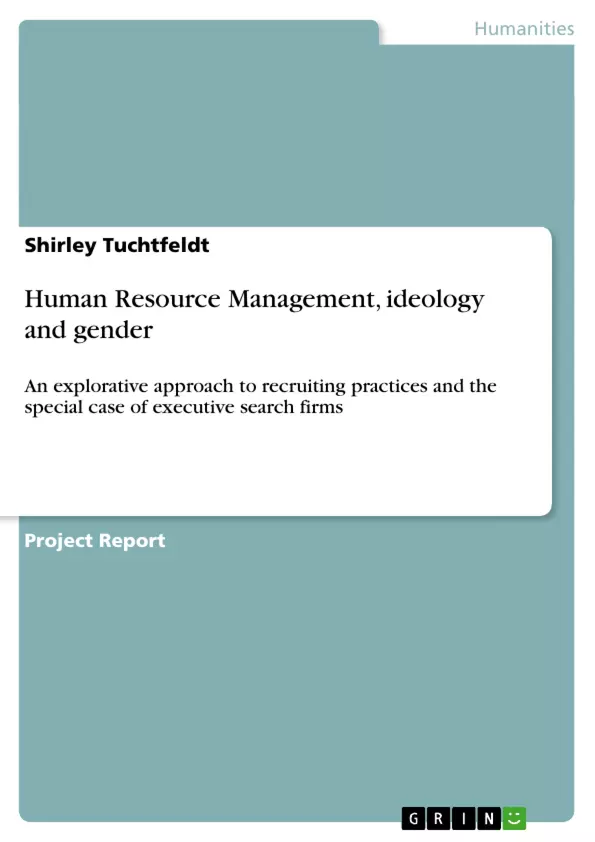The impact of organizational practices such as recruitment and performance appraisal on gender relations in society has received extensive attention from a number of researchers. Various authors profess the gendered nature of bureaucratic organization and its processes and practices. However, the rise of executive search firms as a specialized form of recruitment, strangely has not sparked much scientific interest. Executive search seems to be perceived as not distinctly different from traditional recruitment. However, I suggest that extensive outsourcing of recruitment to external vendors intensifies the segregating effects of Human Resource practices in terms of gender composition of the workforce, primarily due to the structurally immanent disconnection between agency and client company culture as well as the heightened ideology of scientific objectivity and effectiveness associated with specialized recruitment.
In my research for this paper I have pursued three interlinked objectives:
1. to define the role of organizational recruitment practices in producing and reproducing gender inequalities, influencing individuals’ lives and career chances
2. to locate the role of state discourse in facilitating reproduction of inequalities through work practices and to illustrate this with the Singaporean case
3. to explore the special case of executive search firms and suggest the potential effects of outsourcing recruitment functions on gender relations in society
My analysis relies heavily on the review of previous studies as well as on two in-depth interviews conducted with recruitment consultants employed in executive search firms in Singapore.
Inhaltsverzeichnis (Table of Contents)
- Introduction and objectives
- Human Resource Management, recruitment practices and the bureaucratic organization
- The case of Singapore - women's situation and the role of state discourse
- The rise of executive search firms and their implications for gender relations
- Conclusion
- References
Zielsetzung und Themenschwerpunkte (Objectives and Key Themes)
This paper investigates the influence of recruitment practices and the broader context of Human Resource Management (HRM) on gender relations in the workplace, with a particular focus on the emerging role of executive search firms. The paper aims to understand how these practices reproduce gender inequalities, exploring the impact of state discourse and the specific case of Singapore.
- The role of organizational recruitment practices in producing and reproducing gender inequalities.
- The impact of state discourse on the reproduction of inequalities through work practices, using Singapore as an example.
- The implications of outsourcing recruitment functions to executive search firms for gender relations in society.
- The interplay between bureaucratic organizational structures and cultural beliefs in shaping gendered practices.
- The critique of the apparent neutrality of HRM practices and the underlying influence of gendered assumptions and stereotypes.
Zusammenfassung der Kapitel (Chapter Summaries)
- Introduction and objectives: This chapter introduces the research focus, highlighting the gap in research concerning the gendered implications of executive search firms within the broader context of HRM. It outlines the three main objectives of the paper: defining the role of recruitment practices in perpetuating gender inequalities, analyzing the influence of state discourse in Singapore, and examining the specific impact of executive search firms on gender relations.
- Human Resource Management, recruitment practices and the bureaucratic organization: This chapter delves into the concepts of HRM and recruitment practices within the framework of Weberian bureaucracy. It examines how seemingly objective criteria and procedures in recruitment can be influenced by underlying cultural beliefs and assumptions. The chapter further explores the concept of the "gendered organization," highlighting how even organizations aiming for diversity can perpetuate gender inequalities due to embedded cultural norms and the dominance of a male norm in defining job roles and expectations.
- The case of Singapore - women's situation and the role of state discourse: This chapter focuses on the specific context of Singapore, examining the interplay of state discourse and women's situation in the workplace. It explores how state policies and narratives contribute to the reproduction of gender inequalities through work practices.
Schlüsselwörter (Keywords)
This paper examines the intersection of Human Resource Management, recruitment practices, gender relations, bureaucratic organization, state discourse, executive search firms, and the specific case of Singapore. Key concepts explored include gendered organizations, the influence of cultural beliefs on seemingly objective practices, and the perpetuation of inequalities through seemingly neutral processes.
Frequently Asked Questions
How do recruitment practices influence gender inequality?
Recruitment practices often rely on seemingly objective criteria that are actually embedded with cultural assumptions and male-centric norms, which can disadvantage women.
What is the impact of executive search firms on workplace gender balance?
Outsourcing recruitment to specialized firms can intensify segregation because these firms may prioritize "fit" with a client's existing culture, which is often male-dominated.
How does the state discourse in Singapore affect women at work?
State narratives and policies in Singapore can shape societal expectations regarding gender roles, which in turn influences corporate practices and career opportunities for women.
Are Human Resource Management (HRM) practices truly neutral?
The paper suggests that HRM practices are not neutral but are "gendered," meaning they often reflect and reproduce existing societal power dynamics and stereotypes.
What is a "gendered organization"?
It is an organization where the structures, processes, and culture are built around a male norm, making it difficult for women to achieve equality despite formal diversity policies.
- Quote paper
- Shirley Tuchtfeldt (Author), 2007, Human Resource Management, ideology and gender, Munich, GRIN Verlag, https://www.grin.com/document/92525



